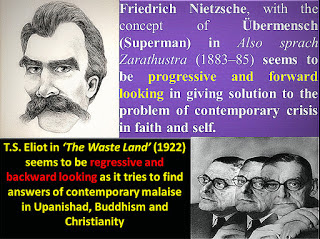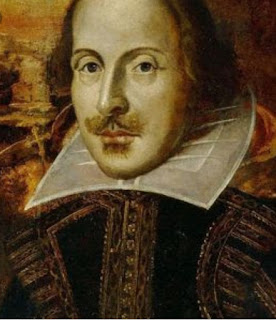The waste land poem on critical thinking activity
According to this task my review
https://dilipbarad.blogspot.com/2014/10/presentations-on-ts-eliots-waste-land.html
The waste land is a poem written by T.S.Eliot. 'The waste land' poem is remarkable work of T.S.Eliot. The poem published in 1922 and it is such long poem of the modern time. A poem divided in five parts.
1) The Burial of the Dead
2) A Game of chess
3) The fire sermon
4) Death by water
5) What the thunder said
Poem divided in five part but its central theme is not change. And if we can say author follow frequency in the poem. The poem follow this theme
• The contrast is between two kinds of life and two kinds of death. Life devoid of meaning is death; sacrifice, even the sacrificial death, may be life-giving, an awakening to life.
• Western society had exhausted its spiritual and cultural legacy. The socio-cultural malaise that affected Western Society in the 1920’s is very effectively projected by Eliot in his poem The Waste Land.
• this poem is essentially a religious poem – a Christian poem. The Christian material is at the centre, but the poet never deals with it directly.
• Sexual sins, perversion of sex, have always let to degeneration and decay.
1) What are your views on the following image after reading 'The Waste Land'? Do you think that Eliot is as compared to Nietzche's views? or Has Eliot achieved universality of thought by recalling mytho-historical answer to the contemporary malaise?
Yes, I think Eliot view regressive to compare with Nietzsche view like progressive. No doubt Eliot had historical sence and tried to explain univer problem with the reference of religious. So his work may be became universal reality of human being. While Nietzsche talked as like practical truth of humanity.
Nietzsch was German philosopher , cultural,critic,composer,poet, philologist and Latin and Greek scholar whose work has exerted a profound influence on modern intellectual history. And I read his contribution in various fields like
then I think he was thought in various fields than Eliot. Because he was not only great historian but also great scholer who thought on various way and also giving solutions to the problem of contemporary crisis in faith and self.
2) Prior to the speech, Gustaf Hellström of the Swedish Academy made these remarks:
T.S. Eliot and S. Freud
What are your views regarding these comments? Is it true that giving free vent to the repressed 'primitive instinct' lead us to happy and satisfied life? or do you agree with Eliot's view that 'salvation of man lies in the preservation of the cultural tradition'?
According to me it is may be true that giving free vent to the repressed 'primitive instinct' lead us to happy and satisfied life. Because as human being or any living animal has nature desire like hungry as human satisfaction desire is also natural. If any human being sepressed their desire may it is focusfilly on self. And I am not agree with Eliot's view that 'salavation of man lies in the preservation of the cultural tradition' because if may be Eliot view wright so why spiritual or traditional person as like Saint , they filled there desire on hidden way. Therefore I believe that cultural tradition not control humans disaster but reality is only our self control our disaster not any cultural traditions.
3) Write about allusions to the Indian thoughts in 'The Waste Land'. (Where, How and Why are the Indian thoughts referred?)
Here I found Indian reference
Ganga was sunken, and the limp leaves
Waited for rain, while the black clouds
Gathered far distant, over Himavant.
The jungle crouched, humped in silence.
Then spoke the thunder
400
DA
Datta means to give: not only charity but giving oneself for some novel cause
DA
Dayadhvam means sympathise – empathise yourself with the sorrows and suffering of others
DA
Damyata means Self Control, control over one’s
passions and desires
Datta. Dayadhvam. Damyata.
Shantih shantih shantih
In the poem Eliot also referred to Indian thought it simple reason may be Eliot tried to make his work world universality. Other hand Eliot may be tried to including every countries tradition which he know and read. This way he tried to give his work immortality in literature. Because as I criticized writers most of describe in their work their culture and traditions while Eliot described lot of culture and traditions, then he concluded poem. And may be he tried to reader feel familiar when they read his poem ' The waste land'. However he also said everywhere is same situation in modern time. That why he gave reference of differ religion and proved his statement same problem of everywhere.
https://dilipbarad.blogspot.com/2014/10/presentations-on-ts-eliots-waste-land.html
The waste land is a poem written by T.S.Eliot. 'The waste land' poem is remarkable work of T.S.Eliot. The poem published in 1922 and it is such long poem of the modern time. A poem divided in five parts.
1) The Burial of the Dead
2) A Game of chess
3) The fire sermon
4) Death by water
5) What the thunder said
Poem divided in five part but its central theme is not change. And if we can say author follow frequency in the poem. The poem follow this theme
• The contrast is between two kinds of life and two kinds of death. Life devoid of meaning is death; sacrifice, even the sacrificial death, may be life-giving, an awakening to life.
• Western society had exhausted its spiritual and cultural legacy. The socio-cultural malaise that affected Western Society in the 1920’s is very effectively projected by Eliot in his poem The Waste Land.
• this poem is essentially a religious poem – a Christian poem. The Christian material is at the centre, but the poet never deals with it directly.
• Sexual sins, perversion of sex, have always let to degeneration and decay.
1) What are your views on the following image after reading 'The Waste Land'? Do you think that Eliot is as compared to Nietzche's views? or Has Eliot achieved universality of thought by recalling mytho-historical answer to the contemporary malaise?
Yes, I think Eliot view regressive to compare with Nietzsche view like progressive. No doubt Eliot had historical sence and tried to explain univer problem with the reference of religious. So his work may be became universal reality of human being. While Nietzsche talked as like practical truth of humanity.
Nietzsch was German philosopher , cultural,critic,composer,poet, philologist and Latin and Greek scholar whose work has exerted a profound influence on modern intellectual history. And I read his contribution in various fields like
then I think he was thought in various fields than Eliot. Because he was not only great historian but also great scholer who thought on various way and also giving solutions to the problem of contemporary crisis in faith and self.
2) Prior to the speech, Gustaf Hellström of the Swedish Academy made these remarks:
T.S. Eliot and S. Freud
What are your views regarding these comments? Is it true that giving free vent to the repressed 'primitive instinct' lead us to happy and satisfied life? or do you agree with Eliot's view that 'salvation of man lies in the preservation of the cultural tradition'?
According to me it is may be true that giving free vent to the repressed 'primitive instinct' lead us to happy and satisfied life. Because as human being or any living animal has nature desire like hungry as human satisfaction desire is also natural. If any human being sepressed their desire may it is focusfilly on self. And I am not agree with Eliot's view that 'salavation of man lies in the preservation of the cultural tradition' because if may be Eliot view wright so why spiritual or traditional person as like Saint , they filled there desire on hidden way. Therefore I believe that cultural tradition not control humans disaster but reality is only our self control our disaster not any cultural traditions.
3) Write about allusions to the Indian thoughts in 'The Waste Land'. (Where, How and Why are the Indian thoughts referred?)
Here I found Indian reference
Ganga was sunken, and the limp leaves
Waited for rain, while the black clouds
Gathered far distant, over Himavant.
The jungle crouched, humped in silence.
Then spoke the thunder
400
DA
Datta means to give: not only charity but giving oneself for some novel cause
DA
Dayadhvam means sympathise – empathise yourself with the sorrows and suffering of others
DA
Damyata means Self Control, control over one’s
passions and desires
Datta. Dayadhvam. Damyata.
Shantih shantih shantih
In the poem Eliot also referred to Indian thought it simple reason may be Eliot tried to make his work world universality. Other hand Eliot may be tried to including every countries tradition which he know and read. This way he tried to give his work immortality in literature. Because as I criticized writers most of describe in their work their culture and traditions while Eliot described lot of culture and traditions, then he concluded poem. And may be he tried to reader feel familiar when they read his poem ' The waste land'. However he also said everywhere is same situation in modern time. That why he gave reference of differ religion and proved his statement same problem of everywhere.







Comments
Post a Comment